How do you tell someone they’re dying?
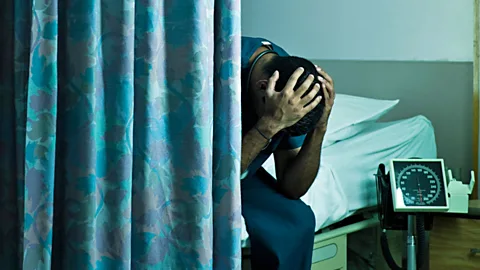
If the person in front of you doesn’t have long to live, what are the right words to tell them? Chrissie Giles asks doctors how they tackle the hardest conversation.
I was 14 when I was told that Dad was dying.
I was sitting on the floor of our lounge. Mum said that she had some news. Sensing the worst, I fixated on the newspaper open in front of me, staring at an advert for German cut glass. It was cancer, in his pancreas, and he might only live a few more months.
They were going to try an operation, she told me and my sister, to reduce the pain. As a nurse, she must have known that this was unlikely to work, but she knew her audience. Pancreatic cancer has one of the bleakest outlooks. By the time you start to notice the nausea, jaundice or weight loss, it’s too late.
That night, as I wrote my diary, I could think only about how I felt. Reading it back now I wonder what it was like for my mum, still reeling from the news herself and having to tell the rest of us.
How do you tell someone that they or a loved one is dying? It’s a question that doctors must continually tackle. I wondered what it was like from their perspective: how they find the right words, what they have learnt not to say, and the toll it takes.
It takes a lot of conversations to find someone who can tell me – in full-colour, human, non-clinical terms – what it’s actually like to have to, on a daily basis, tell people that they’re seriously ill. Finding doctors to talk to isn’t the problem. Our conversations start promisingly enough. But somewhere along the line, everything comes through a professional filter. They become less clear, less direct, obscured in medical language, cloaked in the self-preserving bubble of the passive voice or generalised to just any doctor’s experience. “You can become upset by it but…”
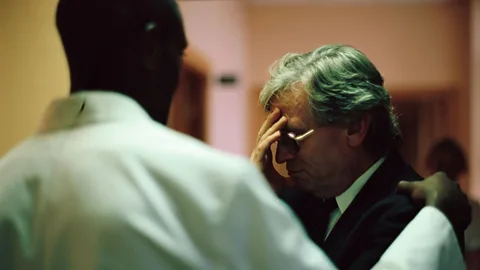
Kate Granger is a doctor with no such barriers. She often deals with discussions of bad news and end-of-life issues. But there’s another reason the subject interests her. Three years ago, at age 29, she was diagnosed with a very rare and terminal form of cancer that affects soft tissue. She’s spoken and written widely about her experiences living with a terminal disease. She spearheaded the #hellomynameis campaign, to get people working in the UK's National Health Service to introduce themselves to every patient they meet. She’s planning to live-tweet her own death.
Granger was diagnosed with cancer while on holiday in the USA. “I came up against some tough episodes of breaking bad news when I got back to the UK,” she says. “When I got my MRI results, I was told when I was by myself by a junior doctor who didn’t know what the plan was going to be.”
Deadly spread
In pain and alone, she was told “without a warning shot” that her MRI scan showed that the cancer had spread. “He was basically giving me a death sentence. He sort of couldn’t wait to leave the room and I never saw him again.”
Her experiences have shaped her as a doctor. “I think I was a fairly compassionate, empathetic doctor, but having been through all I’ve been through, when I came back to work I was just so much more aware of how body language is really important, how you think about the impact of bad news on an individual more than just viewing ‘telling Mrs Smith that she’s got lung cancer’ as a task.”
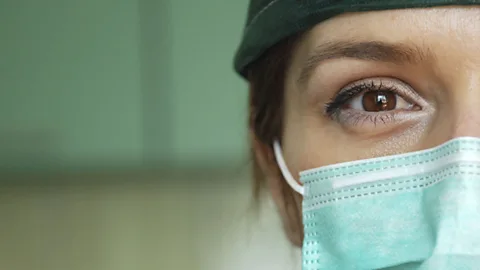
Another doctor I spoke with remembers a woman who came in soon after Christmas. She’d been in and out of the doctor’s over the last nine months or so, with general symptoms that are all too easy to ignore: feeling tired, swelling. Then she had suddenly become jaundiced and short of breath, so a relative brought her into A&E.
It was one of those situations, the doctor says, where you pull the curtain back and immediately think, “This is not good”. “On very few occasions do you touch something and say, ‘This is cancer’.” When she examined the patient’s abdomen it felt “rock hard”.
“She kept saying to me, ‘It’s going to be fine, isn’t it?’ And I’m saying, ‘We’ll do everything we can, let’s just do a few tests and figure out what’s going on.’ At that stage in my mind, I knew it was bad, but I still had to figure out exactly what flavour of bad it was.”
The woman was anxious to be home on New Year’s Eve to make a call to family overseas. But blood tests confirmed that she’d need to stay.
“She said to me, ‘Tell me the worst-case scenario.’ I looked at her. She looked at me. And in my mind I was thinking, ‘She’s not ready for this diagnosis.’ Then her relative stepped in and she said, ‘No, no, she means what’s the worst-case scenario in terms of how long does she have to stay in hospital?’
“At that moment, you realise that we all know exactly what we’re talking about, but we’re all accepting it to different degrees.”
Preparing for the end
So how do doctors train for this moment? In a clinical examination room, with a bed in the corner, six medical students are about to find out. The A4 sign blu-tacked to the door reads: “Room booked for breaking bad news all day”.
“They’re real. They cry, they shout,” the facilitator, a doctor, tells the circle in front of her. Nerves crackle in the air, a few people let out self-conscious laughs. The facilitator is referring to the two actors who have come to rehearse scenarios with the students, who are one year from being qualified doctors.
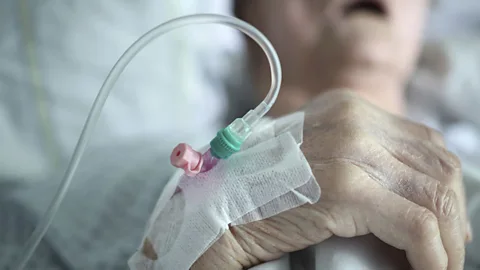
Understandably, they have a lot of concerns: about getting emotional, whether or not they should touch patients, saying the wrong thing, not saying the right thing, not saying anything at all.
The scenarios are given out. The students’ eyes hurriedly scan down their sheets of paper. Cringes. Sharp intakes of breath. One scenario is based around telling a parent that their son has suspected schizophrenia. Another, that a person’s relative has unexpectedly died in hospital. One peers over his neighbour’s shoulder. “You got the short straw,” he says, shaking his head.
When the time comes, his neighbour heads for the door. “You might want to take in some tissues for this one,” the facilitator tells him. “Yeah, for me,” the young man replies.
The rest of the group watch on a live video link, seated in plastic chairs in a half-moon in front of the screen. They touch their faces self-consciously, arms crossed protectively across their bodies. The speaker hisses.
Moment of truth
In the room sit a couple. The woman fiddles with her handbag, refusing to accept the news. The man stares silently at his hands, fists clenched around his mobile phone. “Is that true, or just something you say?” he says aggressively to the young doctor. He’s just been told that his baby, born at just 26 weeks, has severe brain damage and is unlikely to survive.
The students’ eyes dart to each other across the room. A shake of the head, a smile, a wince, sensing their colleague’s pain – pain they are all going to feel for themselves sooner or later.
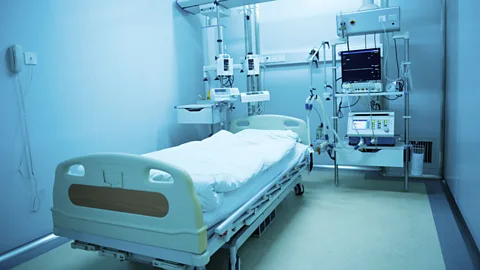
Researchers at Aristotle University in Greece have found, perhaps unsurprisingly, that telling a (pretend) patient that they had cancer was more stressful for a doctor than concealing the diagnosis. Doctors who don’t tell the truth, they suggest, may be doing so to keep control of the situation and avoid their and their patients’ emotional reactions.
The stress of having ‘bad news’ conversations can lead some doctors to put them off, or to deliver news in a less-than-optimal way, says Dr Laura-Jane Smith, a respiratory registrar in training who works in London.
Finding the right time and place to have conversations about things such as progression of disease can be challenging, and patients react in all sorts of ways. “Some people will want to have that conversation when they realise that they’re unwell. Some people will strongly say, ‘I’ve been in hospital before, there’s no way you’re sending me to [intensive care],” says Smith. Some just don’t want to know.
Trade-off
There’s also the danger of shooting the messenger. Katherine Sleeman, medical doctor and lecturer at King’s College London, points to a study showing that patients perceived doctors as better communicators when they gave a more optimistic view of palliative (non-curative) chemotherapy. “It seemed as though you can inform patients that a disease is incurable but at the expense of the relationship with them, which is fascinating,” she says.
The demands that patients and families put on doctors – to find a balance between honesty, truth and hope, to be human, yet not too human, to know everything, even the unknowable – add to the stress.

“I think we find it difficult to admit that we don’t know,” says Stephen Barclay, who researches palliative care at the University of Cambridge, “because patients come to us, and we look to ourselves to be people who investigate, make decisions, make a diagnosis and have an action plan.”
He thinks that doctors find it quite emotionally difficult to acknowledge uncertainty – something that is not born from the doctor’s incompetence but the unpredictability and uncertainty in medicine, particularly during the later stages of many diseases. “It is frightening. No one ever enjoys having these sort of conversations,” he says.
When you are giving bad news about a life-limiting illness, many patients and their families want to know all they can about the condition: treatments, cures and how long patients survive. But the data aren’t always available. Studies are often small, or dated, or in populations of patients so different that findings are hard to relate to the person in front of you. Certainty can be in short supply, at the very time when people want it most.
End date
“How long have I got?” is an especially dreaded question. No clinician I speak to says that they give patients actual numbers, often preferring to talk about whether it is a matter of years, months, weeks or days. This is because judging the course of a disease or condition is notoriously hard. While there are ways to assess imminent death in, for example, a patient with terminal cancer, it can be extremely difficult to estimate how long a patient with frailty, dementia or a chronic lung condition will live. In general, doctors tend to overestimate the survival of terminally ill patients, predicting that they will survive more than five times as long as they end up doing.

Stephen Barclay never gives numbers to patients asking about survival. He reinforces this practice to his medical students: “I teach the students very firmly not to give numbers because often the information isn’t there,” he says. “And if the information is there, it’s average survival and by definition of an average, 50% of patients live longer and 50% live shorter.”
Giving people a ‘sell-by’ date is not only virtually impossible but can be harmful. “I’ve certainly had a number of patients who have been told, ‘you’ve got six months’, and when six months comes they assume they’re going to die today and that can be really difficult if they’re clearly living longer,” Barclay says. Conversely, if things are clearly moving on a lot more quickly then having a particular date in mind can encourage people to have unrealistic hope.
Laura-Jane Smith agrees that you have to choose your words carefully. “What I have realised from having spoken to patients is that they never forget that conversation, and actually quite often they don’t forget the specific words that you use,” she says.
“You fall into the trap of wanting to dress it up, and wanting not to use words like ‘cancer’ and ‘incurable’ and ‘life-threatening’,” she says. “The more that I do it, the more I try and find ways to say things as clearly as possible without being blunt and I think that’s much more effective.”
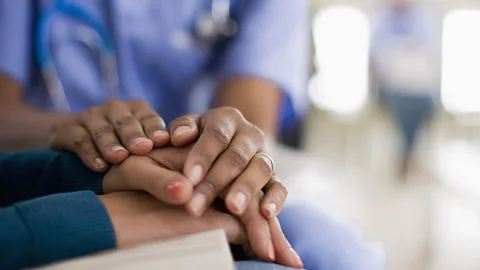
Individual words matter. Elena Semino and colleagues at Lancaster University have been conducting a study of how certain kinds of language are used in communication about the end of life. They’ve collected 1.5 million words of reports, collected from interviews and online forums, where patients, carers or healthcare professionals meet to talk with their peers.
Violence or war metaphors (“battling my disease”, “keep up the fight!”) can be disempowering or disheartening for people with cancer, potentially demanding constant effort or implying that a turn for the worse is a personal failure. But in other contexts, they can empower people, helping someone express determination or solidarity, or bringing a sense of meaning, pride and identity.
“You don’t need to be a linguist to realise what metaphors a patient is using,” says Semino. Doctors should ask: are those metaphors working for the patient at that point? Are they helpful, giving them a sense of meaning, identity, purpose? Or are they increasing anxiety?
Delayed death
Patients have the right to know about their fate, but they also have the right not to know. Stephen Barclay and his research group looked at the timing of conversations about the end of life with patients who had conditions such as heart failure, dementia and the lung disorder chronic obstructive pulmonary disease. “There are a significant proportion of patients who appear not to want to have early open conversations, and some never wish to have conversations at all,” he says. Barclay cautions that the urge for so-called “professional tidiness” – getting these end-of-life conversations out in the open – can lead doctors to place themselves rather than their patient at the centre of the care.
While patients and their relatives may want to delay or avoid conversations that discuss death directly, this isn’t a benign act of self-preservation. A study of over 1,200 patients with incurable cancer has shown that those who had early conversations about the end of life (in this case, defined as before the last 30 days of life) were less likely to receive “aggressive care” in their last days and weeks. This included things like chemotherapy in their last two weeks, and acute care in a hospital or intensive care unit in their last month.
Good communication can even increase hope. Sleeman cites a small study of patients with end-stage renal disease. The researchers found that being given more information earlier on in the course of an illness could increase a patient’s hope rather than extinguish it. “With the provision of prognostic information, new threats will be perceived, but rather than annihilate hope, it provides an opportunity to reshape hopes, making them more consistent with the future,” they wrote.
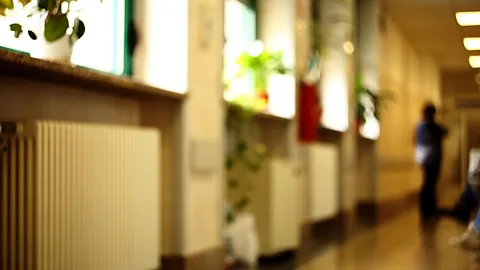
Unrealistic expectations, in contrast, mean that the patient fails to take advantage of the available time. Barclay remembers a patient with advanced cancer who said that his family were planning to take him on a luxury beach holiday in six months’ time. Barclay’s response: could they go a bit sooner, have the holiday in the UK? “They clocked what I was saying, had a holiday in this country the next month – had a lovely time.” Two months later, the patient died.
Though my Dad’s terminal diagnosis came nearly 21 years ago, my mum remembers his reaction clearly. “Dad turned to me and said, ‘Well, I’ve had a good life, a very happy life’.” He was reluctant to have the operation that might prolong – but not save – his life.
I remember him coming home from the hospital soon after, to rest before the operation. We’d bought him an apple turnover, his favourite cake, but it remained uneaten. Dad was propped up in bed, writing a list of things to do. He phoned a neighbour and invited him to take the tools he wanted from our garage. He read a letter an old friend posted through the door, triggering the only tears my mum remembers.
A couple of days later, earlier than planned, he was taken back to hospital. He didn’t come home again. But the short time that he lived knowing he was terminally ill gave him the chance to say goodbye. And us the same.
This is an edited version of an article originally published by Mosaic, and is reproduced under a Creative Commons licence. For more about the issues around this story, visit Mosaic’s website here.
Further reading:
